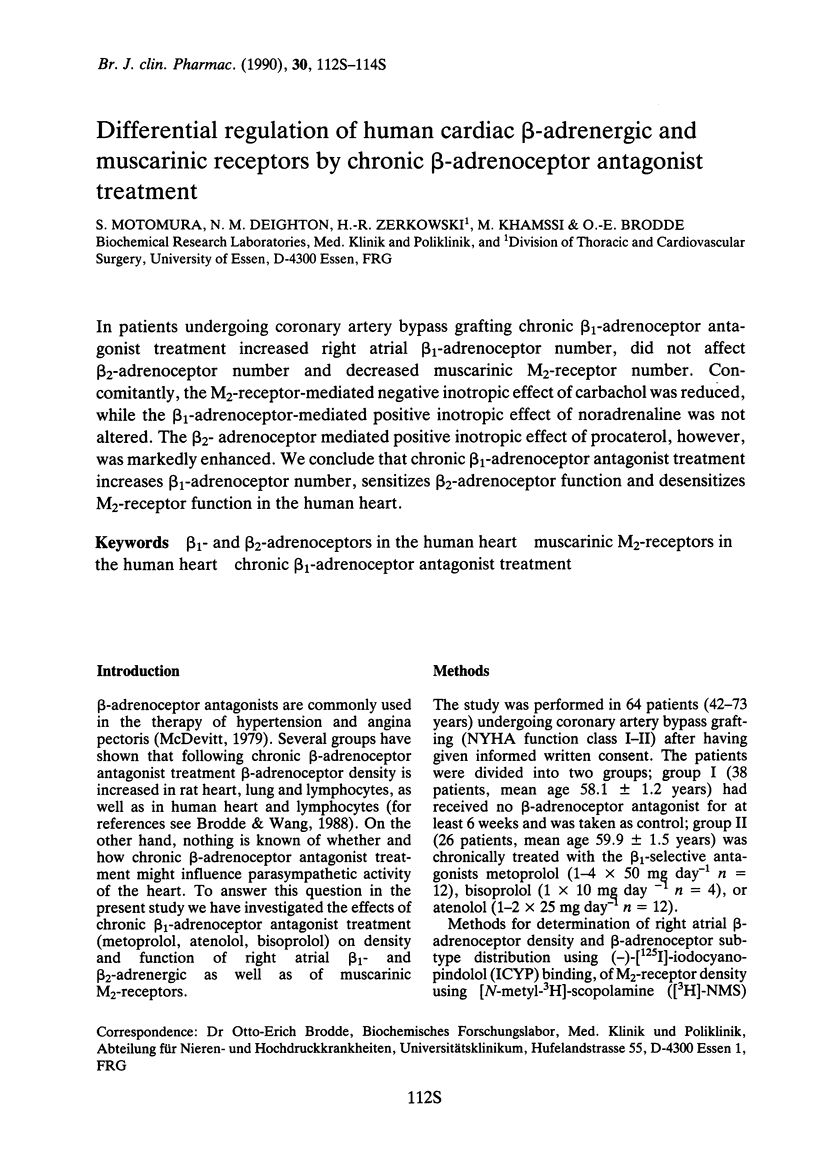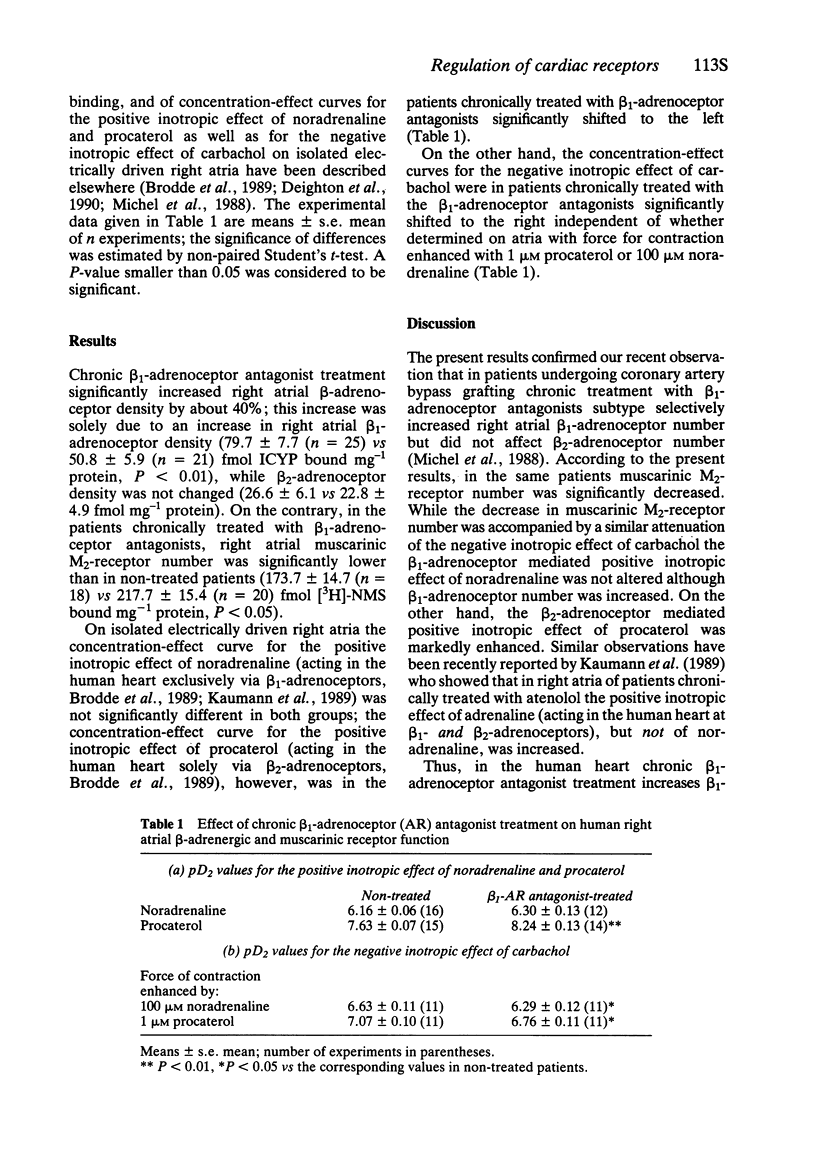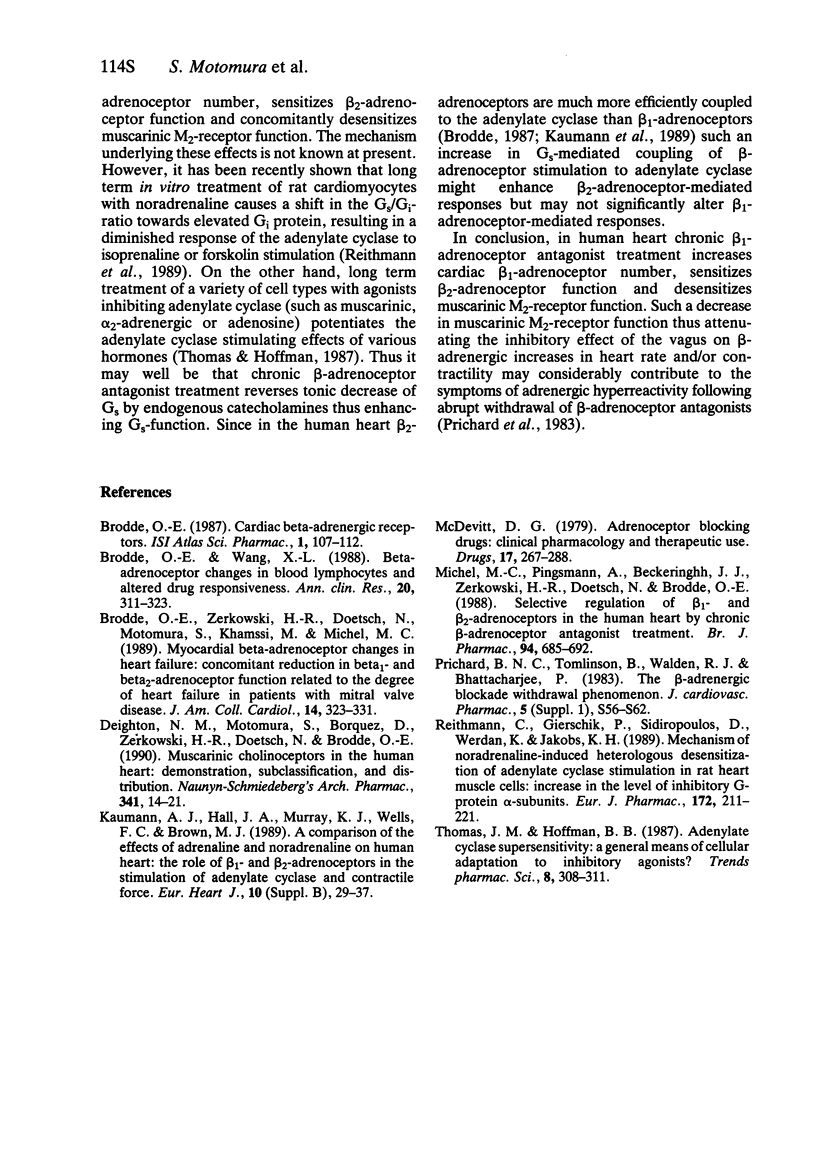Abstract
In patients undergoing coronary artery bypass grafting chronic β1-adrenoceptor antagonist treatment increased right atrial β1-adrenoceptor number, did not affect β2-adrenoceptor number and decreased muscarinic M2-receptor number. Concomitantly, the M2-receptor-mediated negative inotropic effect of carbachol was reduced, while the β1-adrenoceptor-mediated positive inotropic effect of noradrenaline was not altered. The β2-adrenoceptor mediated positive inotropic effect of procaterol, however, was markedly enhanced. We conclude that chronic β1-adrenoceptor antagonist treatment increases β1-adrenoceptor number, sensitizes β2-adrenoceptor function and desensitizes M2-receptor function in the human heart.
Keywords: β1- and β2-adrenoceptors in the human heart, muscarinic M2-receptors in the human heart, chronic β1-adrenoceptor antagonist treatment
Full text
PDF


Selected References
These references are in PubMed. This may not be the complete list of references from this article.
- Brodde O. E., Wang X. L. Beta-adrenoceptor changes in blood lymphocytes and altered drug responsiveness. Ann Clin Res. 1988;20(5):311–323. [PubMed] [Google Scholar]
- Brodde O. E., Zerkowski H. R., Doetsch N., Motomura S., Khamssi M., Michel M. C. Myocardial beta-adrenoceptor changes in heart failure: concomitant reduction in beta 1- and beta 2-adrenoceptor function related to the degree of heart failure in patients with mitral valve disease. J Am Coll Cardiol. 1989 Aug;14(2):323–331. doi: 10.1016/0735-1097(89)90181-2. [DOI] [PubMed] [Google Scholar]
- Deighton N. M., Motomura S., Borquez D., Zerkowski H. R., Doetsch N., Brodde O. E. Muscarinic cholinoceptors in the human heart: demonstration, subclassification, and distribution. Naunyn Schmiedebergs Arch Pharmacol. 1990 Jan-Feb;341(1-2):14–21. doi: 10.1007/BF00195052. [DOI] [PubMed] [Google Scholar]
- Kaumann A. J., Hall J. A., Murray K. J., Wells F. C., Brown M. J. A comparison of the effects of adrenaline and noradrenaline on human heart: the role of beta 1- and beta 2-adrenoceptors in the stimulation of adenylate cyclase and contractile force. Eur Heart J. 1989 Jun;10 (Suppl B):29–37. doi: 10.1093/eurheartj/10.suppl_b.29. [DOI] [PubMed] [Google Scholar]
- McDevitt D. G. Adrenoceptor blocking drugs: clinical pharmacology and therapeutic use. Drugs. 1979 Apr;17(4):267–288. doi: 10.2165/00003495-197917040-00002. [DOI] [PubMed] [Google Scholar]
- Michel M. C., Pingsmann A., Beckeringh J. J., Zerkowski H. R., Doetsch N., Brodde O. E. Selective regulation of beta 1- and beta 2-adrenoceptors in the human heart by chronic beta-adrenoceptor antagonist treatment. Br J Pharmacol. 1988 Jul;94(3):685–692. doi: 10.1111/j.1476-5381.1988.tb11576.x. [DOI] [PMC free article] [PubMed] [Google Scholar]
- Prichard B. N., Tomlinson B., Walden R. J., Bhattacharjee P. The beta-adrenergic blockade withdrawal phenomenon. J Cardiovasc Pharmacol. 1983;5 (Suppl 1):S56–S62. doi: 10.1097/00005344-198300051-00009. [DOI] [PubMed] [Google Scholar]
- Reithmann C., Gierschik P., Sidiropoulos D., Werdan K., Jakobs K. H. Mechanism of noradrenaline-induced heterologous desensitization of adenylate cyclase stimulation in rat heart muscle cells: increase in the level of inhibitory G-protein alpha-subunits. Eur J Pharmacol. 1989 Aug 15;172(3):211–221. doi: 10.1016/0922-4106(89)90051-5. [DOI] [PubMed] [Google Scholar]


